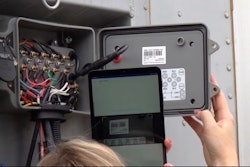Sales of trailer tracking and monitoring systems have been healthy among truckload carriers. This year has seen a record high with fleets upgrading to 4G and 5G devices with expanded functionality to avoid service disruptions from sunsetting 3G CDMA cellular networks.
Use of the technology has been far less common in the less-than-truckload industry sector. Comparatively, LTL fleets operate trailer equipment in a tighter network with more terminal locations, but this doesn’t make assets any easier to manage.
With rising demand from e-commerce, LTL carriers are under pressure to increase capacity. Some are turning to trailer tracking as a way to accomplish this and other needs.
Recently, Estes Express became the first major LTL carrier to begin a fleetwide deployment of a trailer tracking system. The company has been having conversations with a vendor, Spireon, for three or four years to understand how to leverage the technology, explains Rich Schwartz, Estes vice president of engineering and corporate optimization.
Richmond, Virginia-based Estes is an end-to-end transportation and custom logistics solutions provider with 90 years of freight shipping expertise.
Schwartz is planning to use the technology to give fleet operators better tools to do their jobs and to automate and optimize a wide range of yard, dock and pickup and delivery (P&D) processes.










